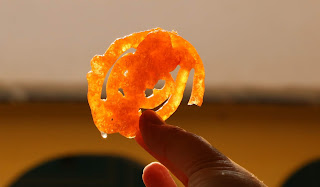Day 9 (Nov 25, 2017)... when Vicki learns that you can find good luck everywhere
Although I'm looking forward to seeing Udaipur—the City of Lakes—I don't want to leave Bijaipur. I am officially in love with rural Rajasthan. On the bus back to the highway, I just wish we could stop.
We see old men with fantastic turbans and pure white robes, crouched down on their haunches; elegant women in purple, blue, yellow, orange saris balancing silver urns or bundles of sticks on their heads; men serving birayani and frying up bright orange jalebis in the market; a pair of cows with curling horns painted red, yellow and green; monkeys sitting on rooftops, grooming each other, and roosters, cows and pigs wandering across the road. It's endlessly fascinating and wonderful.
Land of the kings
The highway to Udaipur is interesting, but in a different way. There are more palm trees now, and more power lines. Construction workers are laying down a new section of highway. We pass a hospital and a university, seemingly in the middle of nowhere. India is a land of contrasts, and the contrast between the poverty in places like Delhi and Agra and the richness of Rajasthan is striking. Our guide explains Indian names while we're driving. Cities with the suffix -bad were named after a Muslim king e.g. Ahmadabad. Cities with the suffix -pur were named after a Hindu king e.g Jaipur, Jodhpur. Raj means king, Maharaj means great king, Maharana means king of kings. The suffix -stan means home or place—similar to the English sense of land.
Our guide explains Indian names while we're driving. Cities with the suffix -bad were named after a Muslim king e.g. Ahmadabad. Cities with the suffix -pur were named after a Hindu king e.g Jaipur, Jodhpur. Raj means king, Maharaj means great king, Maharana means king of kings. The suffix -stan means home or place—similar to the English sense of land.
So, Rajasthan means land of the kings. It makes sense; I feel it. Not just in the forts and palaces, but in the way we are treated.
My new favourite superhero
Our hotel in Udaipur is a basic three-star, on the edge of the inner city, but we get a five-star welcome. There are bowls of fresh flowers on every surface, and a towel is sitting on my bed, folded into the shape of a peacock.
We take a hair-raising tuk tuk ride into old Udaipur for lunch, where I chuckle guiltily at the Hinglish menu and signs. (Urinal Man will forever be my favourite superhero.)
City Palace in Udaipur
After lunch we head to Udaipur's City Palace, a stunning lakeside complex that was built over the course of 400 years, starting in the 16th century. We are guided from one part of the palace to another, each more beautiful than the one before, hearing stories of kings and battles.I hate to admit it, but I'm starting to lose track. (I hear of people getting "templed out" in Southeast Asia; I think I am experiencing the Indian equivalent.)
One thing I am sure of: India has a long and complicated history. You can see it in the architecture: a mix of Islamic, Hindu and colonial influences.
Like many of the places we've visited in Rajasthan, the beauty of the City Palace is in the details: mosaics, carvings and ornate window coverings.
But I love the stories even more than the architecture. My favourite: warrior horses were once disguised as elephants, with leather trunks to confuse the enemy and prevent incoming armies—riding on elephants—from making the first move. Nice.
"If you can love a camel, you can love anyone"
Our guide tells us that there are three important animals in Rajasthan: elephants, who represent good luck; horses, who represent power; and camels, who mean love. "Why camels?" we ask. "If you can love a camel, you can love anyone," our guide tells us.
I see elephants everywhere in Udaipur, not just in the ubiquitous statues of Ganesh—the Hindu god of good fortune—but in countless other statues, carvings, and paintings.
I see elephants everywhere in Udaipur, not just in the ubiquitous statues of Ganesh—the Hindu god of good fortune—but in countless other statues, carvings, and paintings.
Sunset cruise in the City of Lakes
As a tourist, there are certain things you have to do. When you are visiting Udaipur—the City of Lakes—a sunset cruise on Lake Pichola is mandatory. What can I say? It's lovely. Beautiful buildings, melting into the water, glowing in the late afternoon sun. I understand why battles were fought over this region.
As we wait for the boat to depart, I watch a family do their laundry at their home on the edge of the lake: the women beat the fabric into submission, the men wring out the wet clothes and hang them to dry. I love the cooperative nature of Indian society.
As we wait for the boat to depart, I watch a family do their laundry at their home on the edge of the lake: the women beat the fabric into submission, the men wring out the wet clothes and hang them to dry. I love the cooperative nature of Indian society.
We cruise the lake, and take another hair-raising tuk tuk ride back to our hotel. I'm not sure if it has anything to do with elephants, but I feel incredibly lucky to have experienced this place, and this day.















